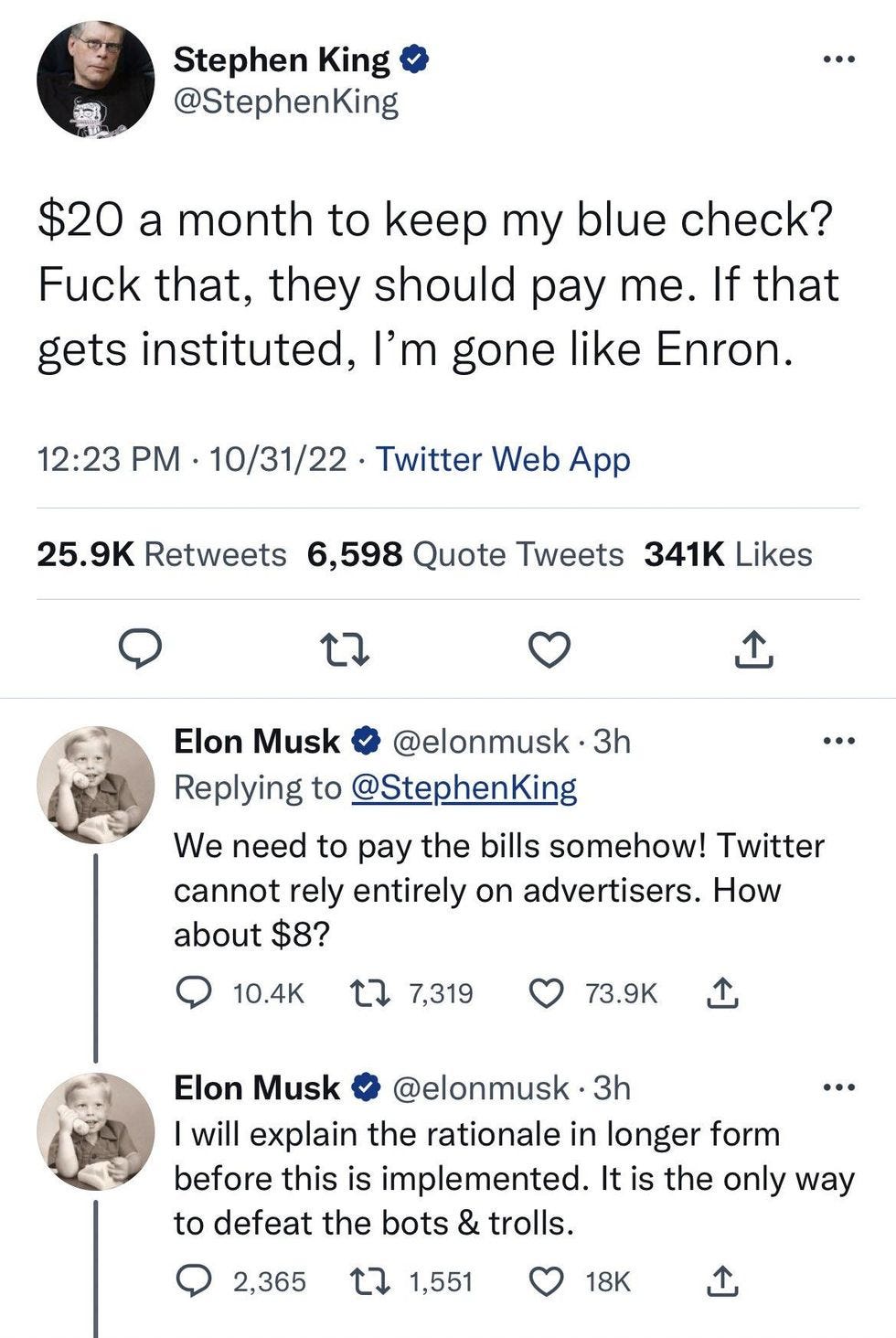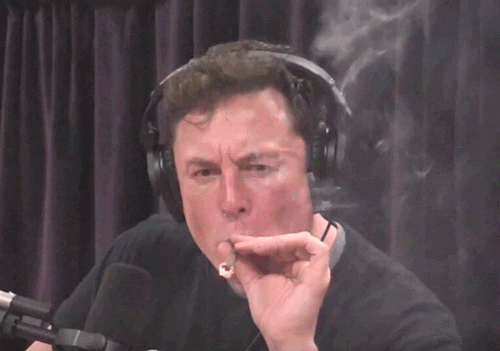It's Possible Elon Musk Didn't Think Any Of This Through
Surely we jest!
Twitter, the social media platform Elon Musk spent $44 billion of hishard-earneddollars on, is currently laughing at this exchange.

Oh dear God, he's haggling .
As Wonkette explained yesterday, Elon Musk appears to be extremely confused about what exactly is the product Twitter sells, and who is the customer . Because, as this outstanding "welcome to hell" essay by Nilay Patel at the Verge explains, the asset Twitter holds is not its technology, which isn't very interesting, but rather its users who can't stop tweeting. As Patel writes, "You! You, Elon Musk, are addicted to Twitter . You’re the asset. You just bought yourself for $44 billion dollars."
Gotta pay the bills somehow! Elon whines. Can't rely "entirely" on advertisers! (Advertisers who, incidentally, won't allow his wet dreams of throwing content moderation out the window to come true.) Of course, as Wonkette also noted yesterday, this is a company whose cash flow last year was about $630 million, and Elon's bad deal means it now will owe an interest payment of a billion a year.
Maybe he is not good at math?
A great new article at The New Statesman explains that charging blue-checked people $20 a month, or $8 a month, for the privilege of being blue-checked on an unmoored social media platform wouldn't put the tiniest dent in Twitter's revenue problems, even if folks like Stephen King up there did seem more inclined to pay it.
If as many as one in five current blue ticks paid $20 a month that would raise just under $15 million a year for Twitter. That might sound like decent money, but Twitter’s current revenues (mostly from advertising) are $5 billion a year. Musk’s apparent plan would generate about 30 hours’ worth of annual revenue.
One would think Elon Musk of all people would know the difference between billions and millions. But maybe he just didn't think any of this through and just assumed his brilliance would prevent his plans from crashing and bursting into flames.
Of course, the article notes, as many have, what a Twitter where large entities like banks and governments that say "fuck you" to Elon's $240/year demands and therefore become unverified might look like. Which one of these accounts is the real US State Department or Bank of America or Ukraine ministry of defense? Golly who knows! We're sure the advertisers will stick around, though, you betcha.
And then of course there's this:
[T]he Twitter Elon Musk has inherited is one that is failing to engage its most active users. These are people defined by Twitter as posting a mere three to four times a week and the network is losing them already . This is a terrible time to ask people for money.
When it comes to its most active users, generally those who are verified, Twitter is useless for monetisation for creators: it has yet to build a Patreon- or Substack-type product and doesn’t share advertising revenue. Having tens of thousands of followers on YouTube or Instagram makes you an income. Having tens of thousands of followers on Twitter makes you a target.
We're sure it will be fine for Elon. He did that very funny thing walking through Twitter's lobby with the sink, after all. Yes, it was like somebody told a rudimentary AI program to tell a joke, but we're sure it inspired confidence.
He's got it under control! He's focused on the big picture!
“It’s really entertaining. Suddenly he’s Grovel McGrovelson for every second rate Trumper with a beef.”
— Josh Marshall (@Josh Marshall) 1667264382
Oh, did everybody hear Elon has ordered the Twitter engineers to work on bringing back Vine? Neat idea, if it was 2017, and TikTok didn't exist.
Innovation!
Follow Evan on Twitter right here!
Have you heard that Wonkette DOES NOT EXIST without your donations? Please hear it now, and if you have ever enjoyed a Wonkette article, throw us some bucks, or better yet, SUBSCRIBE!
Do your Amazon shopping through this link, because reasons .



Pedoman actually saved them though
A margin loan is a loan secured by stock. The advantage to the borrower is that you don't have to sell your stock to raise the cash. You offer it as collateral for the debt. The lender is secured, so the interest rate should be favorable.
The downside (and there's always a downside) is that if the value of the stock declines, the lender must have more collateral. This is a "margin call." In 1929, many investors were buying more and more stock "on the margin." When prices dipped, they had to sell. All that selling at once drove prices farther down, which caused more selling, which caused further declines in the stock price.
Musk's situation is particularly interesting because Tesla is now a private company. What's the stock worth? It's a very risky loan for the lenders. We'll see how it plays out.